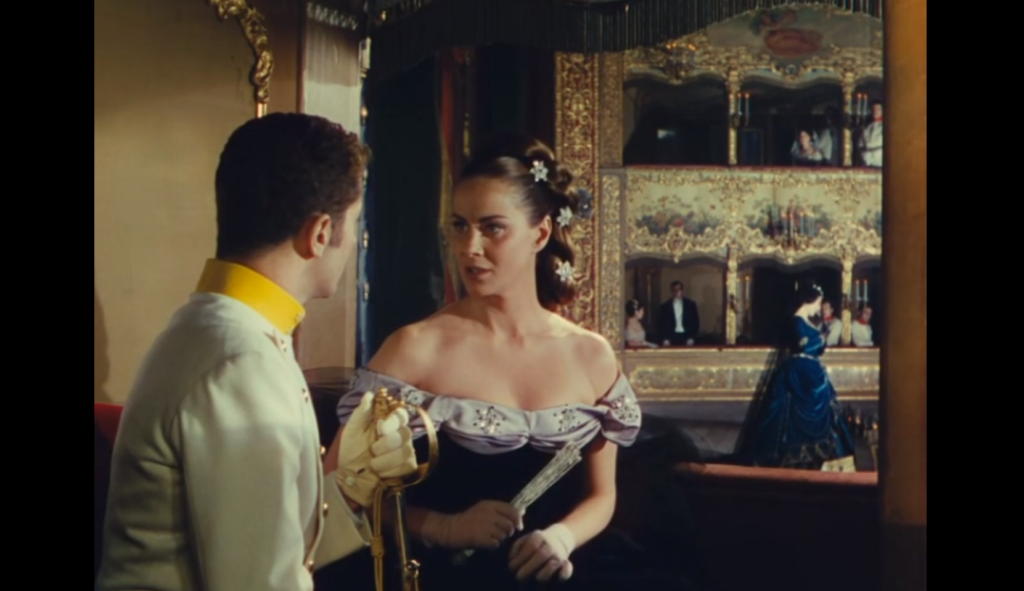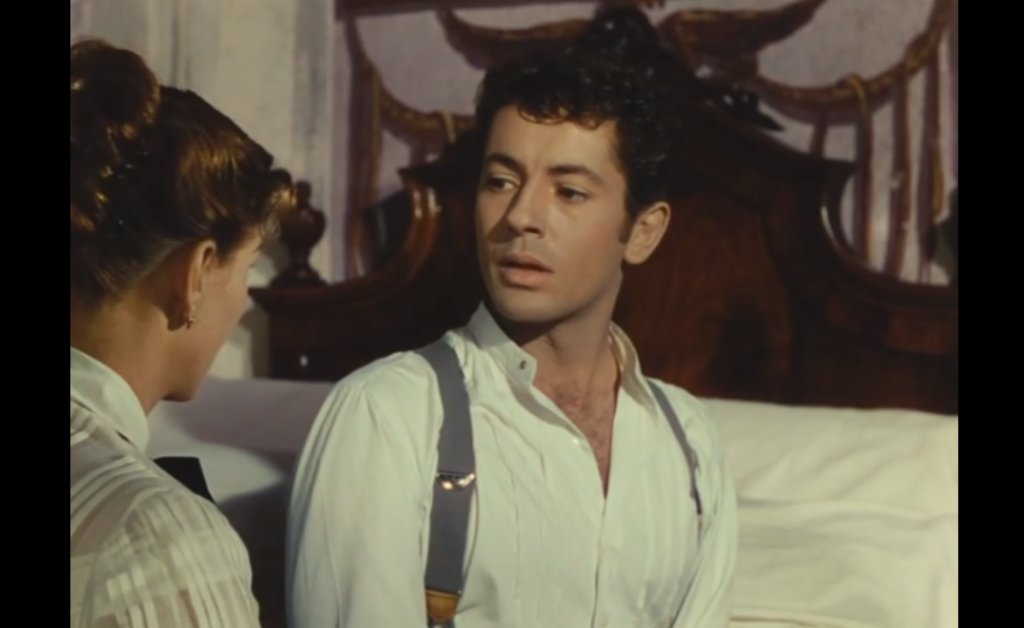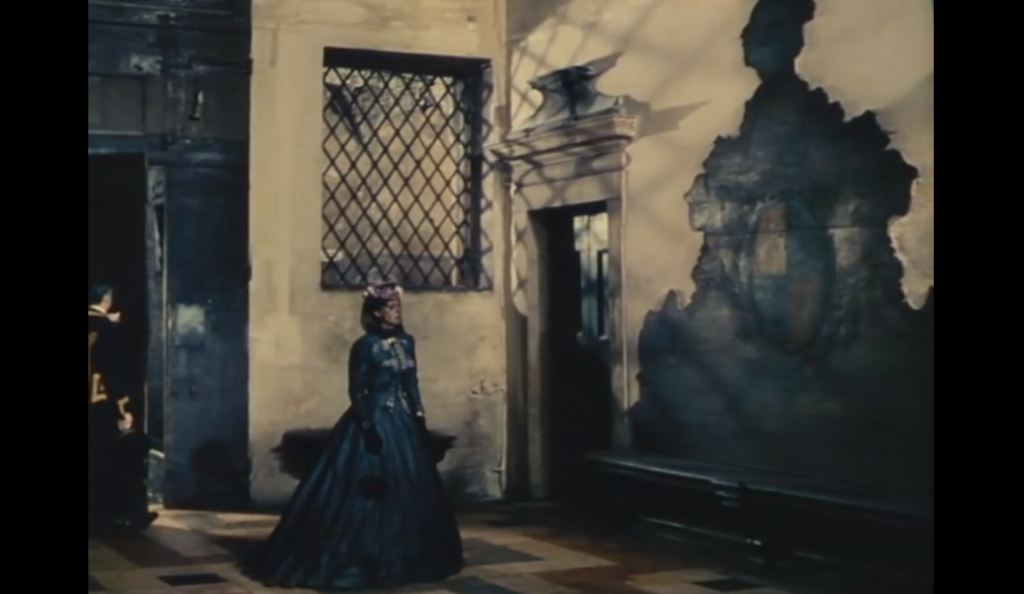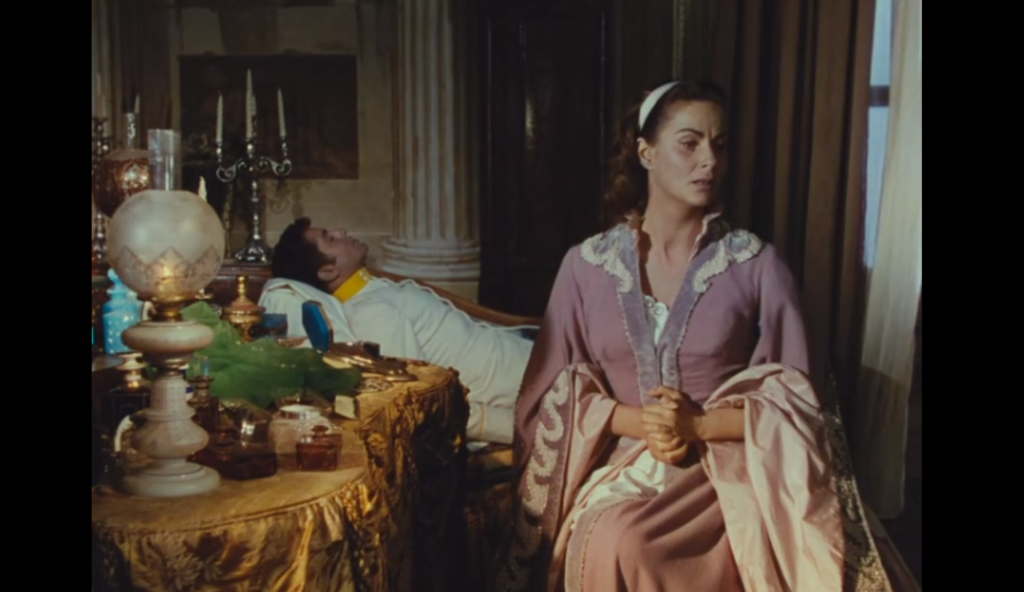“I was indissolubly tied to him. For him, I’d forgotten and betrayed all those who were at that moment fighting and trying to achieve a long-cherished dream.”
|

Synopsis:
During the years of Austrian occupation in mid-19th-century Venice, a married countess (Alida Valli) falls hopelessly in love with a womanizing Austrian lieutenant (Farley Granger).
|
|
Genres, Themes, Actors, and Directors:
- Alida Valli Films
- Cross-Class Romance
- Cross-Cultural Romance
- Farley Granger Films
- Historical Films
- Italian Films
- Luchino Visconti Films
- Obsessive Love
Review:
Italian director Lucino Visconti’s third film after Ossessione (1943) and La Terra Trema (1948) was this Technicolor historical melodrama, starring American heartthrob Farley Granger (speaking surprisingly decent Italian) and beautiful Alida Valli (known to most American audiences for her work in Alfred Hitchcock’s The Paradine Case and Carol Reed’s The Third Man). Unfortunately, while the lush sets and costumes are enjoyable to look at, Senso suffers from an undeveloped screenplay: because we never really learn much about Countess Serpieri’s marriage or her motivations, her act of betrayal against the revolutionary cause in favor of her lover doesn’t make much of an impact. Although things heat up by the final scenes of the film, the movie as a whole is overlong, and ultimately not very satisfying.
Redeeming Qualities and Moments:
- Beautiful Alida Valli as the love-stricken Countess

- Farley Granger as Valli’s duplicitous love interest

- Colorful, sumptuous sets and costumes


- Anton Bruckner’s soaring score
Must See?
Yes, simply for its status as one of Visconti’s first films. Listed as a film with historical importance in the back of Peary’s book.
Categories
(Listed in 1001 Movies You Must See Before You Die)
Links:
|





One thought on “Senso (1954)”
A once-must, for its place in cinema history.
Rewatched this, in its blu-ray version (which helps immensely).
Although I am not a huge fan of Visconti films overall (my favorite might be ‘Rocco and His Brothers’), I will have to go to bat for this one a little more than the assessment allows. For what it is, I think it’s a satisfying film and I don’t find that the screenplay is under-developed. It’s a tragic ‘romance’ and it follows that formula in its own, not wildly unconventional way.
Given Visconti’s penchant for opera, he uses this particular story as a means to express his love of that musical form. Early on, there is a scene (not at all in the original novel) set at an opera house during a performance of Verdi’s ‘Il trovatore’ – that sequence sets the mood and pace for the rest of the film.
I think we learn what we need to know about the Countess’ marriage: it’s dead (to her, anyway). As a result, even though Valli’s character knows in her gut that she should not trust Granger’s character, she allows herself to be sweet-talked by him, during the course of a full night of walking together. Granger’s Franz is very effective as a seducer, so it’s not hard to see what becomes of the Countess’ motivation.
But that’s where things get sticky. Franz’s fellow soldiers give her ample information about his many sexual conquests. The Countess is even warned by Franz himself (“You shouldn’t love me. Nobody should.”). But, as the film seems to teach, passion is often a complete folly.
I revisited this film mainly to see it in blu-ray. I didn’t have much memory of it and actually didn’t look forward to the story itself. But, for a Visconti film, I find it rather accessible to general film fanatics. It’s visually striking throughout. I particularly like the way Visconti handles all of the battle sequences (which are not of epic proportion but, nevertheless, are well-thought-out).
This isn’t a film that I’m all that wild about – even though I think the performances are also strong. But I think it has some interesting dramatic arcs and, overall, succeeds in what it sets out to achieve.
Side note: It would be interesting to know what contributions (exactly) were made by Tennessee Williams and Paul Bowles (both are credited). I could take a stab at guessing (esp. TW’s) but it would be nice to know for sure where they actually occur.